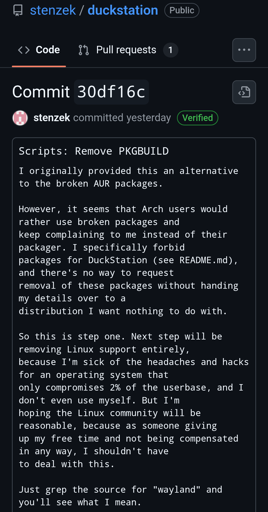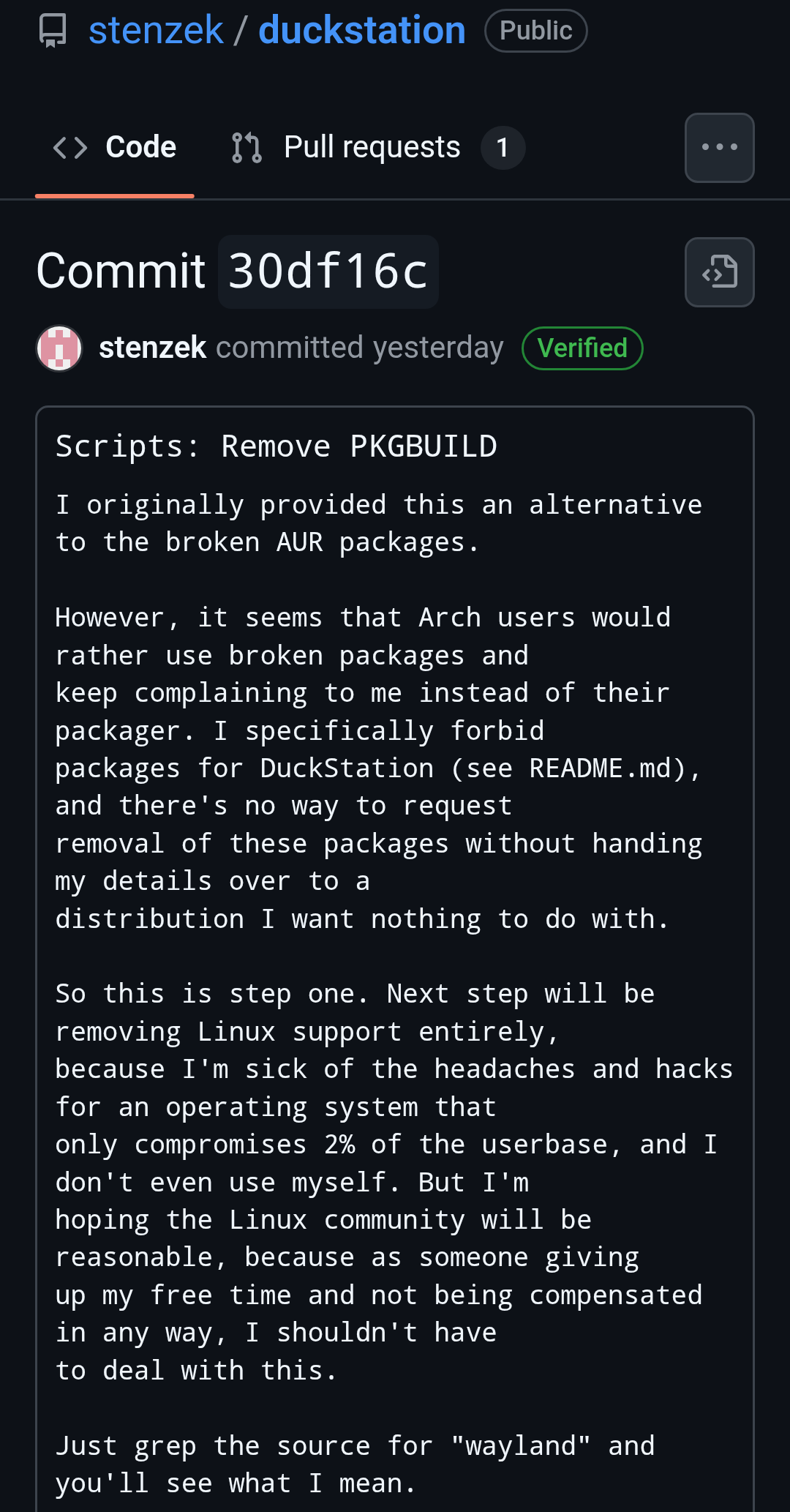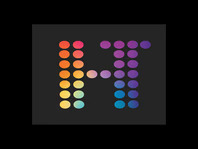Duckstation(one of the most popular PS1 Emulators) dev plans on eventually dropping Linux support due to Linux users, especially Arch Linux users.
-
Its moments like this I'm glad to be a nixos user lol.
Slap that shit in a flake and forget about it. No matter what updates the dev has, or what system the user has, its always gonna compile.
Fuck I love nix.
If it had genitals I'd fucking date it.
Slap those genitals in a flake and get those dinner reservations ready!
Nixos can be whatever your imagination wants it to be!
-
I use arch on a couple of machines and for a rolling release I find it surprisingly hassle free. So with a scientifically relevant sample size of one
 - I declare that it's the people that are the problem.
- I declare that it's the people that are the problem.That is with regular updates though.
I also have a gentoo box that is fine if you let it update every week or two, but tends to need more love and attention if you turn it on again after half a year. I wouldn't be surprised if that's the same for arch. Users who only update twice a year aren't really the target audience for rolling release.
It probably also depends on your hardware and what your usecases are; as always using the right tool for the job helps
Two of us at least! Arch has been the most hassle free of any distro I've used.
Solved my distro hopping 13 yrs ago
-
What a whiny baby XD
-
I see a few top level comments agreeing with the sentiment that users are being entitled or abusive, but what are they actually referring to? The linked image certainly has no evidence of such behavior. Someone who claims to be the developer filed a deletion request for the duckstation-git AUR package on the AUR and they say:
Every time, it turns into abuse towards me, as you can also see in the comments for the package.
I read through a few pages of the comments here and they're mostly people talking about fixing issues with the package, and what to do about the dev purposely breaking the build... I only found a single message that could be called abuse:
@eugene, not really but i suspect it's an uphill battle, check the commit message: https://github.com/stenzek/duckstation/commit/30df16cc767297c544e1311a3de4d10da30fe00c
FWIW, I'm moving to pcsx-redux, I rather run a little bit less advanced PSX emulator than software by this upstream asshat. Regardless, much thanks for maintaining the AUR package so far.
And even this is not a good example of what stenzek is describing. For one, it's obviously a reaction to stenzek's hostile changes and not the sort of user coming for support and being abusive that stenzek is talking about. The user is also explicitly moving to a different emulator and not expecting any change from duckstation.
You gotta learn how to make quotes. I can't tell what is your take or a quote.
-
The answer for this guy and other people stretched by supporting Linux is to say it's flatpak or nothing. Stop trying to build for each dist because it's not sustainable. If someone on a dist wants to maintain a package then let them take the heat if it is broken.
Why should he get a say on how someone else installs the software on their own systems?
If I want to build an arch package instead, what business is that of his?
-
What a whiny baby XD
As a Linux user, I disagree. It's his time and investment. Sometimes you gotta make difficult choices and when users complain about stuff that's unrelated, it's a mess for a dev to deal with. And Linux users are loud
-
Slap those genitals in a flake and get those dinner reservations ready!
Nixos can be whatever your imagination wants it to be!
Not far off base lol. As long as it compiles on whoever's machine decides to repackage the application, it'll run on everyone's.
Most updates its usually just a matter of updating a key.
Its not that hard to make a wrapper for a program designed for hard-linked paths.
-
As a Linux user, I disagree. It's his time and investment. Sometimes you gotta make difficult choices and when users complain about stuff that's unrelated, it's a mess for a dev to deal with. And Linux users are loud
He's a total baby. He gives off big 2000s Windows only user energy
-
He's a total baby. He gives off big 2000s Windows only user energy
This is the type of shit that makes devs not want to support Linux. Respect volunteers.
-
As someone who used to use arch for years, I can't stand its users who go around acting like running it is some herculean task that takes serious knowledge.
In reality its not much more than a misbehaved pet that requires constant attention and a blog post to be read every month or so. Not because its hard, but because its updates are just kinda slapped together and tossed out in the name of speed.
One of the biggest indicators of this is the AUR. For what it was worth, the Gentoo crowd it replaced at least knew how to compile a program.
Maybe learn to use git, tar, and make like literally anyone else on any other fucking distro.
I feel like I'd need to check the wiki less if pacman had flags that made more sense lol. Plus so many variations of commands the wiki warns "this will break your shit".
I really like Arch, I'm using CachyOS, it's been great. But I do miss apt lol. Maybe that's just because I was used to it though. Update and upgrade being two totally different things is also extremely counterintuitive.
-
Arch linux. Hmm. Could it be because of the users? Lately arch linux has become the most popular distro for people trying linux for the first time. Are they all congregating on duckstation's github to cry about it?
-
This is the type of shit that makes devs not want to support Linux. Respect volunteers.
I'm sure that's it.
I'll continue to not use software from mewling babies who blame others because they can't control their own boundaries.
-
Why is it terrible? Appimages are fine.
Appinages are fine. Needing to apply changes as patchsets rather than just building normally sucks. Especially in deb and rpm distros.
-
I'm sure that's it.
I'll continue to not use software from mewling babies who blame others because they can't control their own boundaries.
Are you smoking crack right now? You sound like you are hopped up on something.
-
Are you smoking crack right now? You sound like you are hopped up on something.
Lol ok. XD sure, why not. You crazy kids.
-
I'm sure that's it.
I'll continue to not use software from mewling babies who blame others because they can't control their own boundaries.
What a whiny baby XD
-
He's a total baby. He gives off big 2000s Windows only user energy
Oh yeah, this guy works for free and doesn't like getting reports for things that are beyond his control, this guy is a huge baby, fuck him for working for free!
You're not paying his salary, he doesn't owe you shit. No liability and all that.
People like you are why open source developers quit. They don't get paid for this, and when it's no longer pleasant, they stop doing work.
-
What a whiny baby XD
Lmao yeah, big projection energy coming from that user.
-
Year of the Linux desktop pushed out a year due to Linux infighting and intolerable advocates for the 33rd year. Clearly the fault of the other distros as I use Arch.
-
Lmao yeah, big projection energy coming from that user.
Just you guys who can't help but white knight this guy XD







